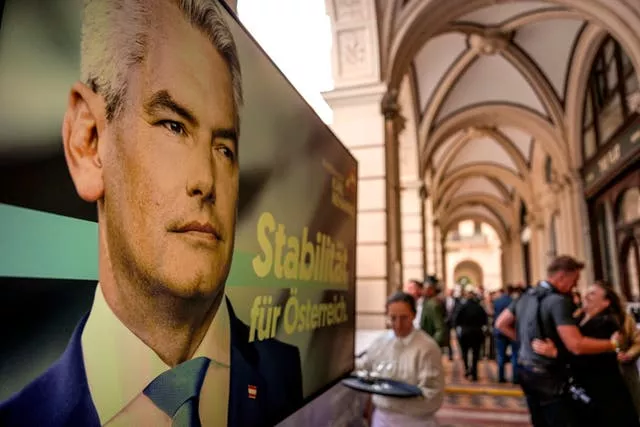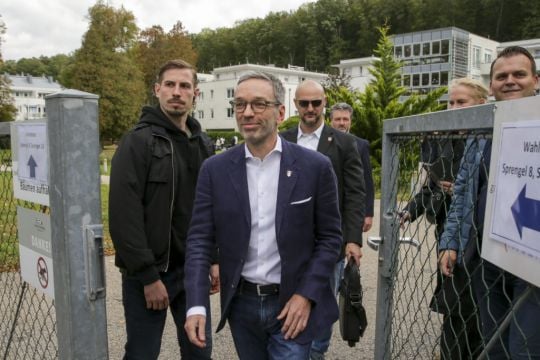The far-right Freedom Party had a lead over the governing conservatives in Austria’s national election on Sunday and was well-placed for its first win in a parliamentary vote, a projection showed. But its chances of governing were unclear.
The projection for ORF public television, based on partial counting, put support for the Freedom Party at 29.2% in the parliamentary election and Chancellor Karl Nehammer’s Austrian People’s Party at 26.3%.
The centre-left Social Democrats were in third place with 20.5%.
Herbert Kickl, a former interior minister and long-time campaign strategist who has led the Freedom Party since 2021, wants to become Austria’s new chancellor on the back of the first far-right national election win in post-Second World War Austria.

But to become Austria’s new leader, he would need a coalition partner to command a majority in the lower house of parliament – and rivals have said they will not work with Mr Kickl in government.
“The voter has spoken. Change is wanted in our country,” Freedom Party general secretary Michael Schnedlitz said, though he acknowledged that “we don’t have the final result yet”.
People’s Party general secretary Christian Stocker conceded that “we didn’t achieve first place” but said his party had come back from lower poll ratings.
And he reiterated Mr Nehammer’s refusal to form a coalition with Mr Kickl — “that was the case yesterday, and it is the case today and it will still be the case tomorrow”.

More than 6.3 million people age 16 and over were eligible to vote for the new parliament in Austria, a European Union member that has a policy of military neutrality.
Mr Kickl has achieved a turnaround since Austria’s last parliamentary election in 2019. In June, the Freedom Party narrowly won a nationwide vote for the first time in the European Parliament election, which also brought gains for other European far-right parties.
In 2019, its support slumped to 16.2% after a scandal brought down a government in which it was the junior coalition partner.
Then-vice chancellor and Freedom Party leader, Heinz-Christian Strache, resigned following the publication of a secretly recorded video in which he appeared to offer favours to a purported Russian investor.
The far right has tapped into voter frustration over high inflation, the war in Ukraine and the Covid pandemic. It has also built on worries about migration.
In its election program, titled Fortress Austria, the Freedom Party calls for “remigration of uninvited foreigners”, for achieving a more “homogeneous” nation by tightly controlling borders and suspending the right to asylum via an “emergency law”.
The Freedom Party also calls for an end to sanctions against Russia, is highly critical of Western military aid to Ukraine and wants to bow out of the European Sky Shield Initiative, a missile defence project launched by Germany.
The leader of the Social Democrats, a party that led many of Austria’s post-Second World War governments, has positioned himself as the polar opposite to Mr ickl. Andreas Babler has ruled out governing with the far right and labeled Kickl “a threat to democracy”.
While the Freedom Party has recovered, the popularity of Mr Nehammer’s People’s Party, which currently leads a coalition government with the environmentalist Greens as junior partners, has declined since 2019.
During the election campaign, Mr Nehammer portrayed his party, which has taken a tough line on immigration in recent years, as “the strong centre” that will guarantee stability amid multiple crises.
Under their leadership, Austria has experienced high inflation averaging 4.2% over the past 12 months, surpassing the EU average.
The government also angered many Austrians in 2022 by becoming the first European country to introduce a coronavirus vaccine mandate, which was scrapped a few months later without ever being put into effect.
And Mr Nehammer is the third chancellor since the last election, taking office in 2021 after predecessor Sebastian Kurz – the winner in 2019 – quit politics amid a corruption investigation.
But the recent flooding caused by Storm Boris that hit Austria and other countries in Central Europe brought the environment back into the election debate and may have helped Mr Nehammer slightly narrow the gap with the Freedom Party.







